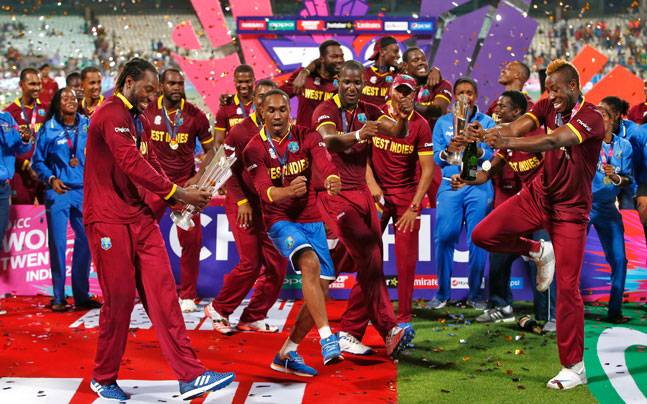Twenty20 is the relatively new cricket format where West Indies cricket, and its players, currently enjoys a modicum of international success. But the very success in Twenty20 has made this format one of the biggest risk factors to achieving overall West Indies success in all the current formats of international play in the long term.
Twenty20 cricket has injected some new and much needed energy into the staid old pastime of cricket. Not only has it allowed for more participants into the game of cricket, it has also, because it is structured as a franchise endeavor, presented cricketers in general, and West Indies cricketers in particular, the opportunity to continue to ply their trade, and to even make a decent living at that trade.
Although 20/20 cricket was not invented by the West Indies, it is a form of the game of cricket that ideally suits the temperament of both our West Indies cricketers and our West Indies fans. Short, entertaining, unconventional, brash and over the top, T20 as it is referred to, is the perfect medium to display our bravado, style, and yes, even our creativity.
Our players have always been good in short period bursts. They display a flair and panache unequaled by any other in the cricketing world. They blaze, and blaze brightly, for their short time in the game. That is the very premise AND promise, of T20 cricket: entertainment and aggression for 240 balls.
And absent the arrogant, brazen and garish behaviour that inevitably shows up, there is enough professionalism to temper bad behaviour and make the experience enjoyable to the fans, who themselves become part of the spectacle.
But some of the very tendencies that are critical to success in T20 cricket in general, are the ones that have acted as stumbling blocks to West Indies progress in the One Day International and Test formats of the game.
The individualistic, immediate, power tactics of T20 need to be replaced by, or at least tempered with, a partnered, occupational, finesse strategy for the ODI and Test formats. In short, West Indies has to relearn how to effectively combine their tactics into long-term winning strategies.
And that is where West Indies has run into difficulties for a while now. Having enjoyed tremendous success in the T20 format of the game, our players have – not unexpectedly – played the other formats of the game in the same manner in which they have enjoyed their success. They try to attack the ODI and Test matches with the same approach they use to address the T20, make as many runs with sixes and fours as quickly as they can. But more often than not, our teams run into a surfeit of overs in ODI, and a deficit of wickets in tests.
The lack of adjustment from T20 mode was so apparent at one point, that one of the foremost of our great former West Indian captains was moved to sarcastically comment that the players were ‘drunk on T20’, when accounting for their lack of performance in the other formats.
Even more alarming and disturbing, is the growing number of the young who have succumbed to the lure of the Twenty20 siren song. That Twenty20 cricket provides all the value, monetary or otherwise, that can be found in the game of cricket. That one can be more successful and financially secure than before by being an itinerant T20 specialist for hire, ‘rōnin’ if you will, in a landscape of ever increasing T20 franchises.That ODI and test cricket are no longer formats to aspire to. THAT PLAYING FOR WEST INDIES IS NOT THE PROFESSIONAL PINNACLE FOR AN INCIPIENT WEST INDIES CRICKET TALENT
So the young focus on developing their ‘match winner’ talent, the proficiency to bludgeon the last few balls beyond the boundary. The art of rotating strike is never mastered, the expertise of running between the wickets not developed, and the skill to build an inning not nurtured. In short, the spirit and essence of cricket deliberately sabotaged for that exhilarating but oh so brief moment as savior.
Twenty20 cricket is not the villain here. In fact it may well be, in hindsight, the savior of cricket in general, and West Indies cricket in particular. But it must also be acknowledged that the success of West Indies cricket in the T20 format, without corresponding successes in the ODI and test formats raise the spectre of the negative impact of T20 on the other formats.
To be fair, it is not really the tactics that are at fault, but more so the inability to change the focus of the strategy to one that is applicable to the particular format. As a coach so succinctly put it, T20 revolves around runs, ODI is about overs, and test cricket concerns wickets. Although runs, overs and wickets are important components to every game, a winning strategy often requires planning and focus around runs for T20, overs for ODI and wickets for tests.
Without a completely different set of players for each of the cricket formats, the players who play all or at least two of the three formats, need to adjust their thinking and their mentality as they move from one format to the next. Their fundamental approach to playing cricket may remain the same but the implementation of their approach needs to change from format to format.
That unwillingness to align approach to format, continues to be ever more challenging with our players, who portray a certain sense of disinterestedness or lack of preparedness at being professional when wearing the region’s colors at the international level.
So as West Indies continues to struggle to win the odd ODI and Test match here and there, the questions will only get louder and more persistent, possibly drowning out the true root causes of the failure to successful compete and consistently win in the formats that West Indies had previously mastered.


Leave a Reply